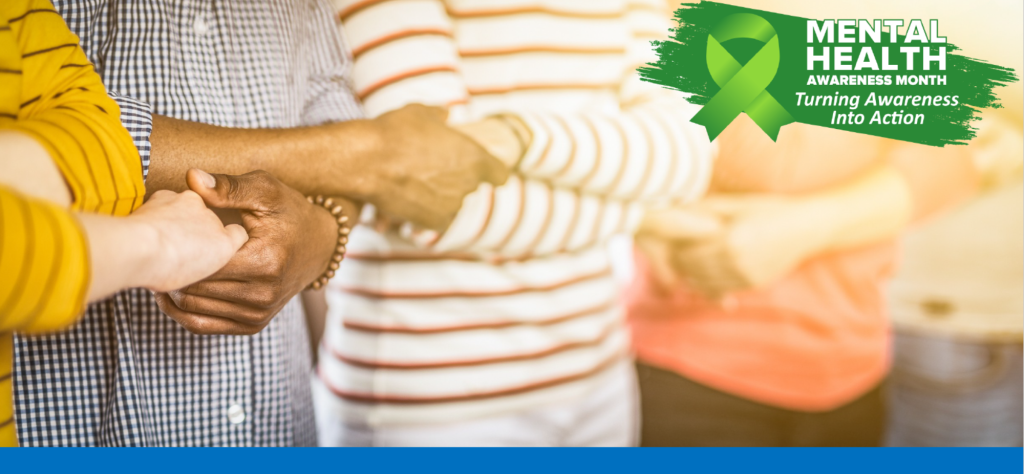Week 2 (October 6–12) is dedicated to Mental Health Screening & Depression Awareness, with National Depression Screening Day taking place on October 9. This week serves as a critical reminder that just as we schedule annual physical exams, we should also prioritize mental health check-ins.
Why Mental Health Screenings Matter
Mental health conditions are far more common than many realize. According to the National Institute of Mental Health (NIMH, 2023), nearly one in five U.S. adults lives with a mental illness. Depression alone affects an estimated 21 million American adults annually, making it one of the most prevalent mental health challenges (Substance Abuse and Mental Health Services Administration [SAMHSA], 2022).
Unlike physical health conditions, depression can be harder to detect. Symptoms often include persistent sadness, loss of interest in activities, fatigue, difficulty concentrating, and changes in sleep or appetite. Left unaddressed, depression can impact work performance, relationships, and overall quality of life. In severe cases, it may increase the risk of suicide. Early detection is key to preventing escalation and supporting recovery.
Mental health screenings are confidential, brief questionnaires that help identify symptoms of depression and related conditions. While they are not diagnostic tools, they can serve as a first step in recognizing when professional help may be needed. Much like a blood pressure test signals whether someone should seek further evaluation, screenings provide valuable insight into whether follow-up care could be beneficial.
The Role of Awareness and Stigma Reduction
Despite progress in recent years, stigma remains one of the biggest barriers to seeking help. Too often, individuals dismiss their symptoms as “stress” or believe they must “tough it out.” Campaigns like National Depression Screening Day aim to break down those barriers by normalizing conversations around mental health and encouraging people to treat it as seriously as physical health.
Raising awareness within our communities—whether at work, at home, or among friends—creates a supportive environment where people feel less alone. Sharing resources, promoting open dialogue, and highlighting the benefits of early action are powerful ways to foster resilience.
Depression in the Workplace
The workplace is often where symptoms of depression become visible. The World Health Organization (WHO, 2022) estimates that depression and anxiety cost the global economy $1 trillion annually in lost productivity. For employees, depression can manifest as missed deadlines, frequent absences, or difficulty engaging with colleagues.
Employers play an important role by offering education, supportive policies, and access to care. Initiatives such as flexible scheduling, employee assistance programs (EAPs), and comprehensive health benefits can help you navigate your mental health journey without fear of stigma or penalty.
Maximize Our Benefits
Kalamazoo College provides a robust Employee Assistance Program in which all employees receive access to six (6) free sessions with a licensed counselor. Should you like to learn more about the program or use any of its resources, please click the link provided above.
Additionally, employees enrolled in our health plans may access inpatient and outpatient benefits with copayments as low as $10.00 (Orange plan) and $25 (Black plan). Copayments, Coinsurance and Deductibles on our mental health and substance abuse services match our medical plan equivalent, so there are no surprise prices when you need care.
In addition to health benefits, the College provide wellness programs and initiatives on a periodic basis with the goal of creating a resilient, vibrant and health community. Please click the link provided above to learn more about how you may participate or become involved.
Act This October
As we recognize Mental Health Screening & Depression Awareness Week, here are a few ways to engage and support your well-being:
- Take a Screening: Online and in-person screenings are widely available. Mental Health America and other organizations offer free, confidential assessments.
- Talk to Someone: If you notice symptoms in yourself or a loved one, consider reaching out to a trusted friend, family member, or professional.
- Use Your Benefits: Schedule an appointment with a counselor, therapist, or primary care provider to discuss your mental health needs. Kalamazoo College employees can also use the Employee Assistance Program (EAP) and health plan benefits for support.
- Attend a Wellness Event: Take part in Mindful Mondays or other campus wellness activities to prioritize your mental health during the workday.
- Spread Awareness: Share resources in your workplace, community, or on social media to help others access support.
Mental health is health. By prioritizing screenings, reducing stigma, and making full use of available benefits, we can create a culture of care that empowers individuals to seek help early and live healthier, more fulfilling lives.
References
- National Institute of Mental Health. (2023). Mental illness. U.S. Department of Health and Human Services. https://www.nimh.nih.gov/health/statistics/mental-illness
- Substance Abuse and Mental Health Services Administration. (2022). Key substance use and mental health indicators in the United States: Results from the 2021 National Survey on Drug Use and Health. U.S. Department of Health and Human Services. https://www.samhsa.gov/data/
- World Health Organization. (2022). Mental health in the workplace: Information sheet. https://www.who.int/news-room/fact-sheets/detail/mental-health-in-the-workplace
- Mental Health America. (n.d.). Take a mental health test. https://screening.mhanational.org/

